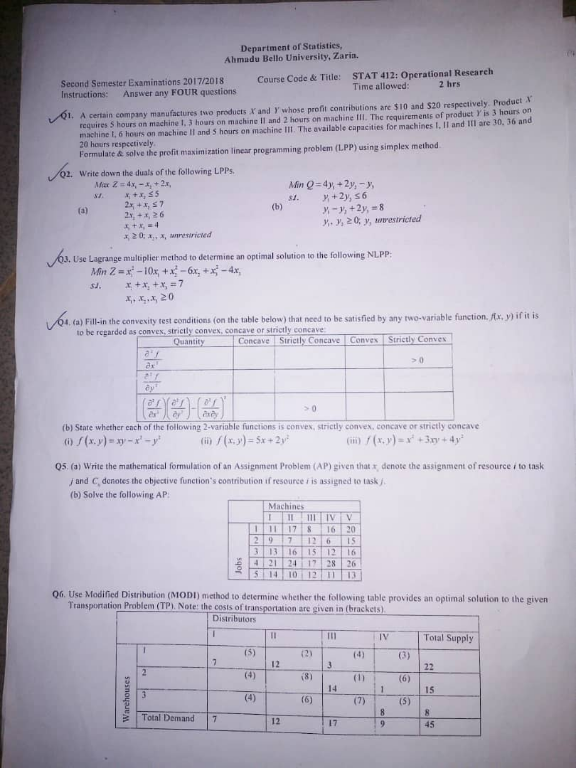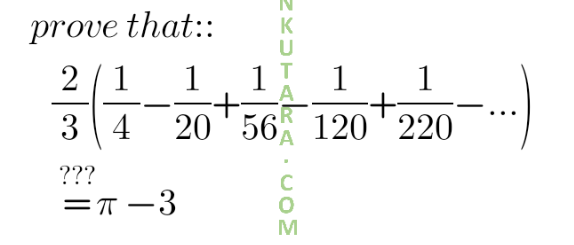
Question and Answers Forum
Operation ResearchQuestion and Answers: Page 2



|
Question and Answers Forum |
Operation ResearchQuestion and Answers: Page 2 |
| Γ(((n+1)/(1−i)))=???? |
| e^((((ζ(2))/2)−((ζ(3))/3)+((ζ(4))/4)−((ζ(5))/5)+...)) =? |
| ∫_0 ^∞ ((1/( (√(1+x))))−(1/( (√(1+x^2 )))))(dx/x)=log(2) |
| wich program to run genetic algorithm? |

|

|
| (1/(1+(π^2 /(1+(((π+1)^2 )/(1+(((π+2)^2 )/(1+...))))))))+(1/(1+(((π+1)^2 )/(1+(((π+2)^2 )/(1+...))))))=(1/π) Prove or disprove |
| ((1+(1/2^2 )+(1/3^2 )+...)/4^2 )+((1+(1/2^3 )+(1/3^3 )+(1/4^3 )+..)/4^3 )+((1+(1/2^4 )+(1/3^4 )+...)/4^4 )+..=(3/4)log(2)−(π/8) |
| (1/(1+(η^2 /(1+(((η+1)^2 )/(1+(((η+2)^2 )/(1+(((η+3)^2 )/(1+..)) ))))))))=(1/2)ψ(((η+2)/2))−(1/2)ψ(((η+1)/2)) (η>0) Or K_(r=0) ^∞ (η+r)^2 =(2/(ψ((η/2)+1)−ψ(((η+1)/2)))) |
| ...+(1/((1−2π^2 )^2 ))+(1/((1−π^2 )^2 ))+1+(1/((1+π^2 )^2 ))+(1/((1+2π^2 )^2 ))+...=((csc^2 ((1/π)))/π^2 ) |
| ∫_0 ^1 log^2 (Γ(x))dx |
| [ (x+1)^(2 ) D^2 +(x+1)D+1 ]y = 4cos (ln( x+1)) |
| Solve 134^(x+1) =16^x −768 |

|
| A_n =(1+(√5))^n −(1−(√5))^n A_n =???? |
| W_n =Σ_(k=1) ^(2n) (k/(n^2 +k^2 )) montrer que W_n converge et calculer la valeur de W_n |
| Given that a, b and c are real numbers that stisfy the system of equation above a − (√(b^2 − (1/(16)) )) = (√(c^2 − (1/(16)) )) b − (√(c^2 − (1/(25)))) = (√(a^2 − (1/(25)) )) c − (√(a^2 − (1/(36)) )) = (√(b^2 − (1/(36)))) if a+ b + c = (x/( (√y))) where x, y are positive integers and y is square free, find the value of x + y ! |
| when do I use ∣x∣ for (√x^2 )? |
| A binary operation has the property a∗(b∗c) = (a∗b)•c and that a∗a=1 for all non−zero real numbers a,b and c. (′•′ here represent multiplication). The solution of the equation 2016∗(6∗x)=100 can be written as (p/q) where p and q are relatively prime positive integers. What is q−p? |
| y′′+2y′+y=e^(−2x) +2x+3 |
| 2^(x+5) =(√8^x ) |
| S_n =Σ_(k=1 ) ^n k^2 (−1)^k C_n ^k =? please help |
| solve the differential equation y^′ −2e^x y=2e^x (√y) |
| let x,y,z be a complex numbers as ∣x∣=∣y∣=∣z∣=1 { ((x+y+z=1)),((xyz=1)) :} calcul (1/x)+(1/y)+(1/z)=? x=? y=? z=? please i need a help |
| 1−1+(5/9)−(7/(27))+(9/(81))−((11)/(243))+..... |
| solve x (d^2 y/dx^2 )−(dy/dx)−4x^3 y = 8x^3 sin(x^2 ) |